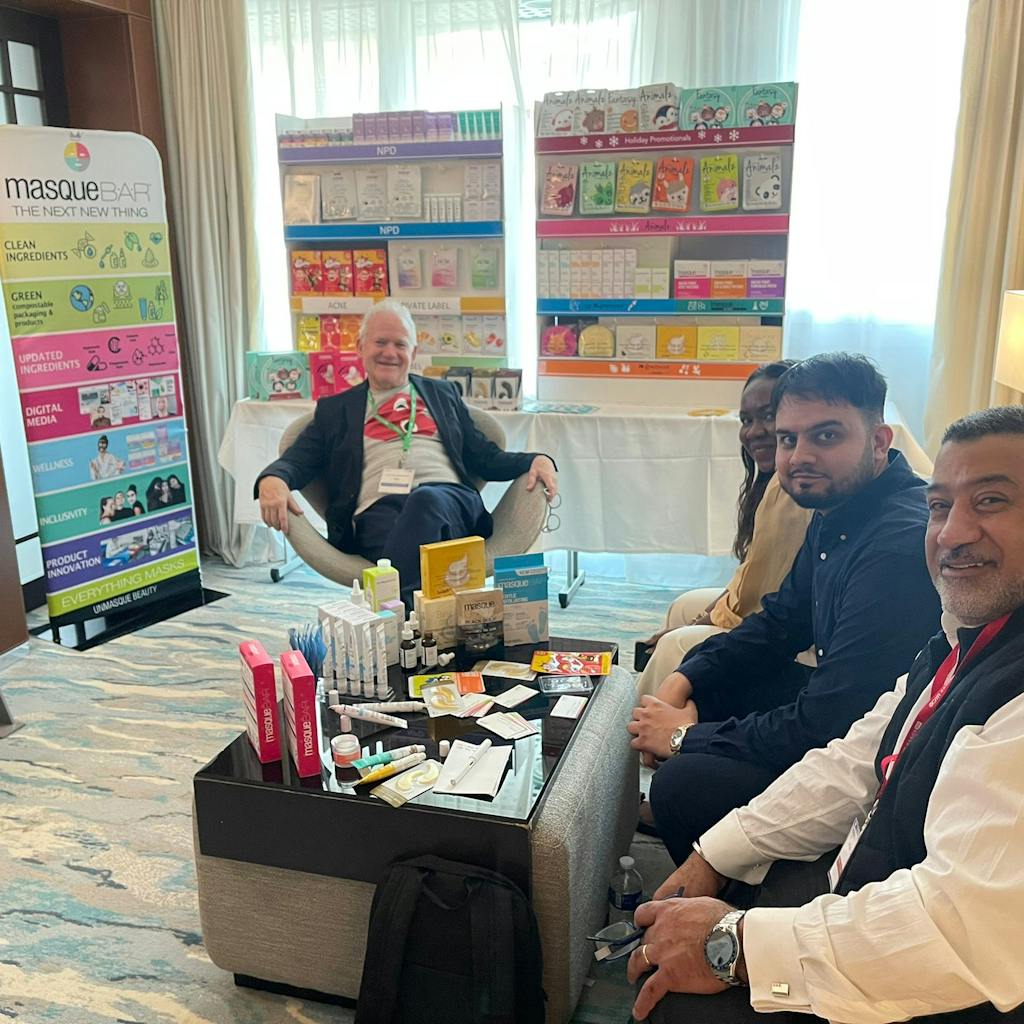If you are considering entering the U.K. market, there are several things you should know about doing business with retailers there. Recently, RangeMe published a blog post on understanding the British consumer, focusing on overarching trends across the country’s retail landscape. In this post, We’ll get a buyer’s in-the-trenches perspective on some important items for brands to consider when looking to get on the shelves in the U.K.

Peter Mudahy is the CEO of Pak Cosmetics (pictured to the right), one of the largest multicultural beauty retailers in the U.K., with 27 stores and a thriving e-commerce business. As a RangeMe member who has participated in more than two dozen ECRM and ECRM Europe sessions, he has a ton of experience engaging with global suppliers looking to enter the U.K. market (In fact, he’s at the ECRM Europe Beauty Sessions meeting with global suppliers as I write this.)
I sat with Mudahy virtually for an hour-long discussion to pick his brain for advice to suppliers looking to do business with U.K. retailers. The following are some insights I gleaned from our conversation.
It’s a smaller market with great opportunities
Right off the bat, suppliers – especially those from the U.S. – should be aware that the U.K. is a relatively smaller market compared to some other countries. Retail sales are £456bn, compared to approximately $5 trillion in the U.S. But it’s a growing market with many great opportunities for suppliers looking to expand their reach.
Get up to speed on U.K. regulations for consumer products
While the U.K. is no longer part of the European Union, it currently follows the EU regulations when it comes to consumer products, and these are much more strict than those in the U.S. “I think the best way to explain it is that in the U.S., regulators tend to address a concern with a product or an ingredient after something negative has happened,” points out Mudahy. “Whereas in Europe, they are very much preventative; if they think an ingredient is likely to harm a consumer they will ban or restrict it.”
As the U.K. is no longer part of the EU, it’s currently going through a consultation process as to what their specific regulations will be in the future, but for now, they are following those of the EU.

Sustainability and the plastic tax
To provide a clear economic incentive for businesses to use recycled plastic in their packaging, and to encourage more recycling and the collection of plastic waste, the U.K. applies a tax to plastic packaging that is manufactured in, or imported into the U.K., that does not contain at least 30% recycled plastic. (Plastic packaging is predominantly plastic by weight. The tax does not apply to any plastic packaging which contains at least 30% recycled plastic, or any packaging which is not predominantly plastic by weight.)
You must have a designated Responsible Person
All medical devices, electronics, cosmetics and food supplement products available to consumers must have a ‘Responsible Person’ who ensures safety measures and legal obligations are in place. A Responsible Person can be a business or an individual (including sole traders), and must have a U.K.-established address. The Responsible Person can be either the manufacturer, importer, or distributor, if they label the product as their own (for example, using their brand name); or an appointed company or person (who is named by the manufacturer or the importer).
“This law is very strict,” says Mudahy. “If your product doesn’t have a U.K. address on it, you can’t place it on the market. You put their details on the back of your product, they will hold your product information, and if someone wants to contact the manufacturer then they have an address they can write to that can legally take service of their inquiry. Several providers out there offer these services, such as Obelis Group, which works with many of my customers.”
Other costs of doing business for retailers

As you prepare to negotiate prices and margins with U.K. retailers, you have to keep in mind that there are many costs they have that must be considered. “The cost of running my business is now over 40%, so that means I need to make at least a 60% margin to make a profit,” says Mudahy.
Among the items adding to these costs are the increased prices of imported goods and credit card fees incurred by shoppers increasingly moving away from cash payments. For example, just a few years ago, more than half of Pak Cosmetics shoppers paid in cash. Now, 90% are paying with credit cards, which means more credit card fees for his business.
Also, sales tax in the U.K. is included in the price; it’s not added to the price that the consumer pays, but rather taken from the retailer. So it must be built into the price of the product.
Consumers want brands they recognize
U.K. consumers are a bit hesitant to take a flier on a brand they don’t already know and trust, which means that retailers will also be hesitant to put a brand on the shelf unless it has a serious marketing push behind it. “For us at Pak Cosmetics, we like to be a supplier of demand,” says Mudahy. “We’re not going to build your brand for you. I need products that are going to increase my basket volume, get new customers through my doors and grow my business. If you’re a brand that can help me do that, I’m open to you.”
Delivering value is key
Inflation has hit the U.K. very hard, and many shoppers are seeking to get the biggest bang for their buck – or rather, for their pound. Because of this, Mudahy is seeing them gravitate toward larger pack sizes, and in some cases, bundles, which tend to do well around holiday seasons. He points out that this is not the case for his more well-heeled consumers, who know what they want and are not impacted by any discounting. So keep this in mind if your products are targeted toward the mainstream consumer. (Pak operates six e-commerce sites, including one for masstige and one for prestige products, and the data show a big difference in shopping behavior among each.)
There is a need for education
Unlike the U.S., where consumers tend to be very ingredient-savvy, especially when it comes to beauty products, in the U.K., shoppers are still in the dark regarding many of these ingredients, according to Mudahy. So brands should provide some education on their products’ ingredients and the benefits they deliver. This is particularly true of older U.K. consumers, who prefer to be educated about the brands they use, and are less responsive to flashy marketing.
Social media and your brand’s digital footprint
Having a strong social media presence is extremely important for brands addressing the U.K. market, both from the perspective of consumer engagement with the brand, but also to help drive these consumers into the store. But Mudahy points out some differences between younger and older consumers and how each interacts with social media.
“I’m seeing the younger generations following more of the global influencers,” says Mudahy. “They are looking at what is going on in the U.S., Canada, and other countries. “Now there is some risk to that, because what tends to happen is that they come into the store looking for a product that’s not in the U.K. market. They don’t want to know why; they don’t want to hear about compliance; they don’t want to hear about challenges in logistics. They just want to know why we don’t have it. However, this doesn’t happen as much with the older generations, as they tend to follow local or regional influencers to get their information.”
In addition to social media, it’s also important for brands to show how they will include retailers in their entire digital ecosystem. The brands that see success in the U.K. are very tuned in to email marketing, paid search, and SEO. “When I sit with a brand I want to know what they are going to do to help us to be a part of their digital footprint,” says Mudahy. “I want to know that when someone goes online to search for their product, Pak Cosmetics comes up in the results as the place to find it.”
Advice for brands based in the U.K.
While most of the above points apply to U.K.-based brands, the one advantage that local suppliers have that global suppliers don’t is easy access to the retailers’ stores, and they should take advantage of it by visiting them often. “Don’t assume that you know our business,” says Mudahy. “Walk our stores, see what types of customers are shopping, and come and talk to us. There is probably a lot that we can do for you, and even if we can’t, we certainly know people who can help you in terms of building your brand.”
And if your brand is based in the U.K. RangeMe Premium memberships are now available. Premium memberships come with many benefits that enhance visibility and access to U.K. retailers, including the opportunity to submit products directly to select retailers. To learn more about the benefits of RangeMe Premium, click here.



